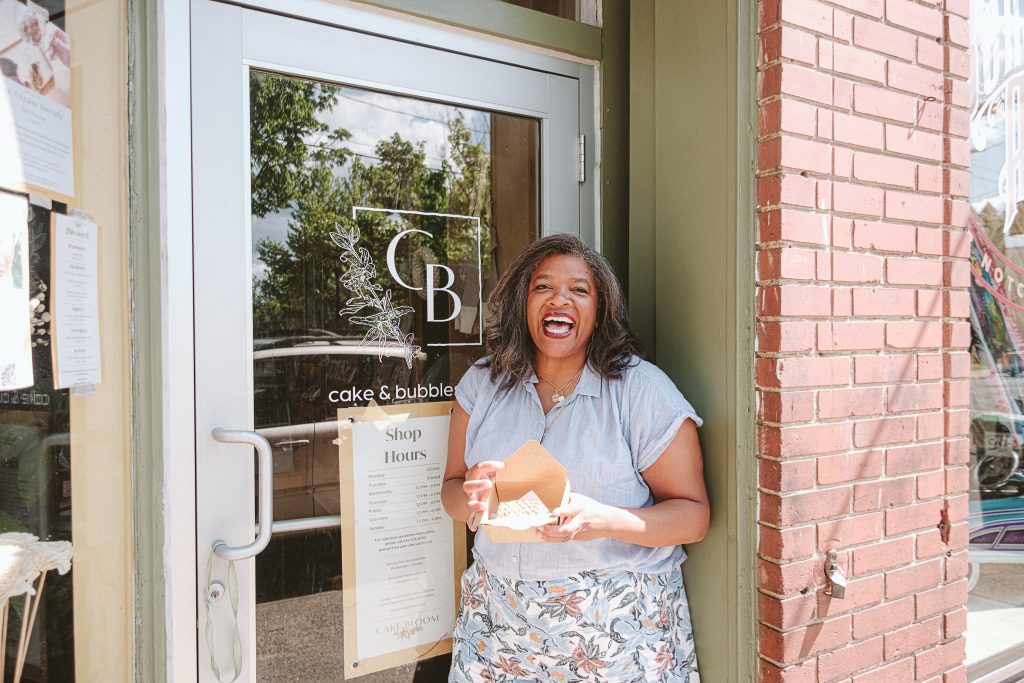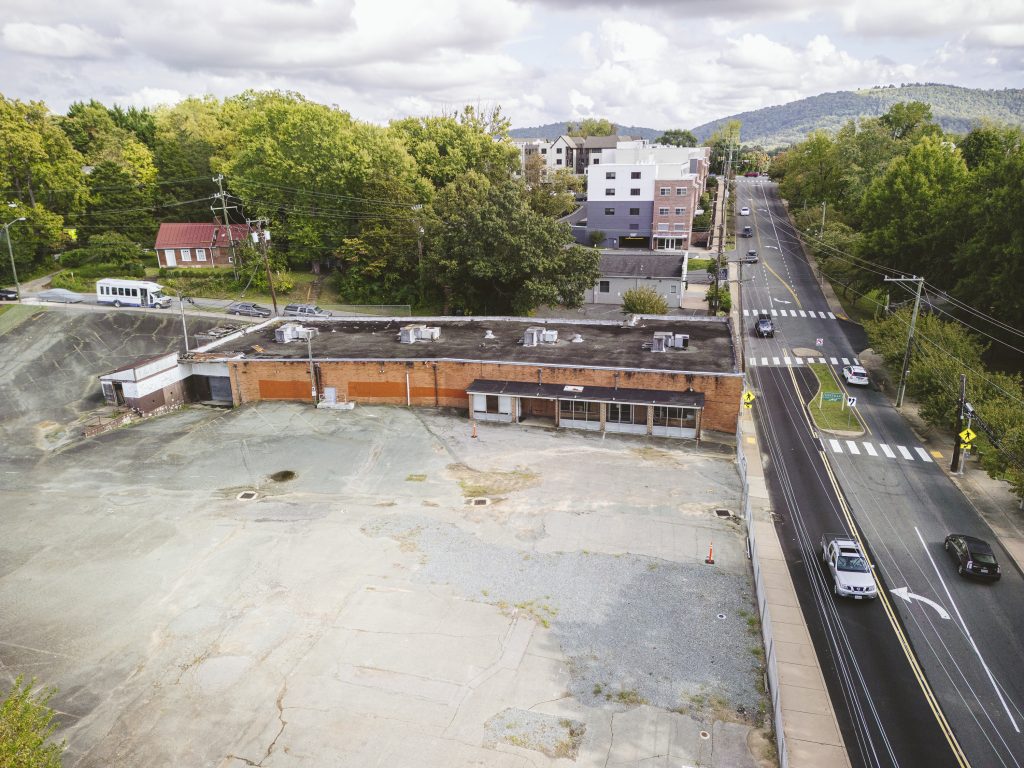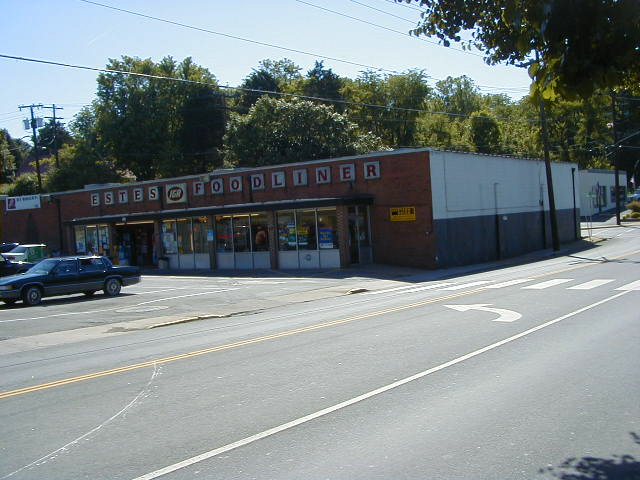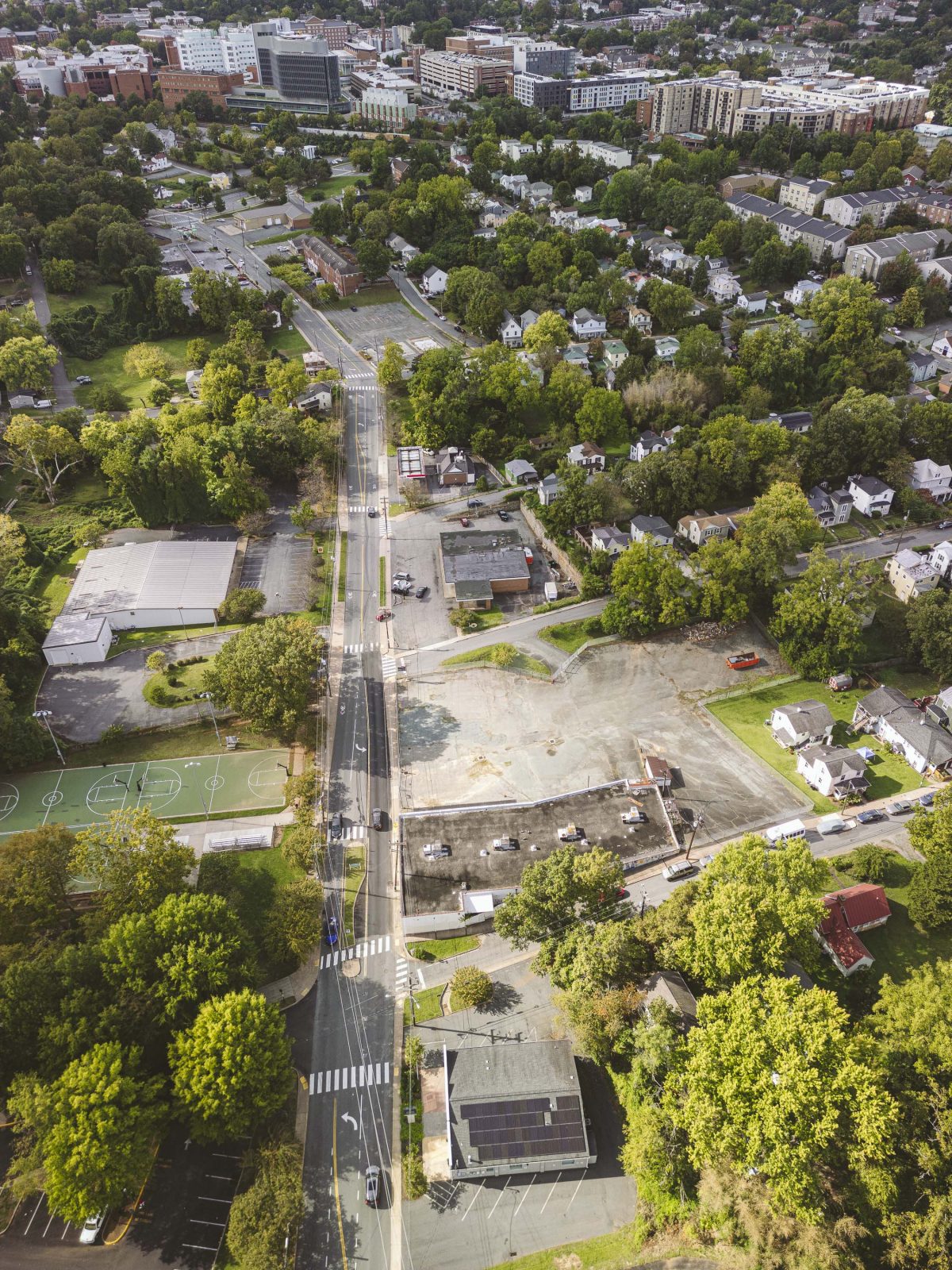There are no places on Cherry Avenue or West Main Street where residents of the Fifeville neighborhood can walk to buy fresh ingredients to prepare nutritious meals, but Aleen Carey doesn’t want you to call the area a food desert.
“A desert is a naturally occurring state,” said Carey, the co-executive director of Cultivate Charlottesville. “Not having any grocery stores or Black-owned businesses or the food access that the community wants, that is not naturally occurring. That is man-made. So instead of a food desert, we call it a food apartheid.”
That term was coined by New York food justice activist Karen Washington to draw attention to the interconnections between access to food and other socioeconomic and health inequities.
Cultivate Charlottesville formed in 2020 when local organizations Food Justice Network, the Urban Agriculture Collective of Charlottesville, and the City Schoolyard Garden merged to put a more intentional focus on those interconnections at the local level.

The nonprofit is active on many fronts including administering the city’s Food Equity Initiative, trying to secure new garden space in Washington Park—and assisting with a broader effort to bring a community grocery store to Fifeville. Woodard Properties, the new owner of 501 Cherry Ave., agreed in September 2023 to provide space for one as part of a rezoning.
But to make the idea a reality, the community will have to organize.
Buy back the block?
Carey was one member of an August 24 panel discussion at the Jefferson School African American Heritage Center, an event the Fifeville Neighborhood Association organized for the public to learn more about the opportunities on Cherry Avenue.
Deanna McDonald of RN Heartwork is partnering with the Fifeville Neighborhood Association on the effort to increase awareness of the space.
“I come to this project as it relates [to] health equity, food equity, and food security,” McDonald told the crowd of about a hundred people.
For decades, Estes Market at 501 Cherry Ave. served as a place to buy fresh food, but people who lived in the area in the late 20th century said the market played a much larger role.
“Estes was more than just a grocery store,” said Sarad Davenport, a longtime resident of Fifeville who served as moderator of August’s Buy Back the Block event. “It was a community center. In fact, I learned how to play chess in Estes’ parking lot.”

Davenport is the host of “Can I Talk To You, C-Ville?,” a series of programs put on by Vinegar Hill Magazine including one held September 23 that illuminated more details on the status of negotiations for how the space might be operated as a grocery.
Dorenda Johnson has lived in the neighborhood for 55 years and remembers more than just Estes Market.
“I can remember on Fifth Street there was Bell’s Store and Allen’s Store and down the street on Cherry Avenue was Estes [IGA],” she said. “All of those neighborhoods around those stores were predominantly Black neighborhoods and it was bustling and busy.”
Andrea Douglas, the Heritage Center’s executive director, said there was a time when ownership of commercial businesses was more diverse in central Charlottesville.
“There were seven grocery stores run by Black people in this community,” Douglas said.
One of those, at 333 W. Main St., was run by George Inge, whose establishment was a pillar of the community from 1891 to 1979 (and stands today as Tavern & Grocery restaurant). The structure built in 1820 survived the razing of Vinegar Hill and Garrett Street while many others, like Allen’s Store, did not.
According to research conducted by journalist Jordy Yager, Allen’s Store opened on Sixth Street SE in 1944 and closed when the property was taken by eminent domain as part of the Garrett Street urban renewal project in the 1970s, leading to the creation of what would become known as Friendship Court. Its owners, Kenneth Walker Allen and Dorothy Mae Murray Allen, would later relocate their business to the Rose Hill neighborhood in the space that is now home to MarieBette Café and Bakery.
Douglas said efforts to bring a new grocery store to serve the neighborhood is part of a long movement to restore what was lost during urban renewal.
When she was a child, Johnson said she would spend her days in Tonsler Park walking to and from what is now Prospect Avenue. Her parents worked hard to buy their own house, as did so many others.
“Now when I go through those neighborhoods it’s very discouraging and I see it’s no longer the predominantly Black neighborhoods,” Johnson said. “We have $700,000 homes that were bought for barely half of that. What would our parents say?”
After Emancipation, many people enslaved in Albemarle County and on plantations, such as the Oak Lawn estate on Cherry Avenue, would settle in a Charlottesville that was growing in the late 19th century.
“After the [Civil] war, a number of folks who were enslaved there moved into what is the Fifeville neighborhood,” said Jalane Schmidt, an associate professor of religious studies at UVA.
This included figures such as Benjamin Tonsler, who had been born into servitude in Earlysville in 1854. After receiving an education in Hampton, Tonsler returned to Charlottesville and became a leader in the community along with Inge. Another group, called the Piedmont Industrial and Land Improvement Company, was formed in the last decade of the 19th century to promote Black ownership of real property. They did so through the Four Hundreds Club, an informal group of Black families belonging to the middle class, who purchased lots of land priced at $400.
“There is a direct connection between emancipation, personal economy, land ownership, entrepreneurship, and food security,” Schmidt said. “How to put those pieces together that have been shattered is the question that we’re dealing with now.”
Redeveloping the Estes Market
Woodard Properties bought 501 Cherry Ave. in August 2022 for $3.5 million, the latest in a series of purchases the company has made in the area in recent years. Woodard is partnering with the Piedmont Housing Alliance to build 71 apartment units that will be rented to households with incomes below 60 percent of the area’s median income.
One condition of a rezoning granted by City Council in September 2023 is that a portion of the property be set aside for the Music Resource Center as well as an area that would be reserved for a very specific reason.
“Owner agrees to reserve a minimum of 5,000 square feet of commercial space at the Property for lease to a small grocery store or neighborhood grocery store that sells fresh produce,” reads binding language in the rezoning agreement. “The space will be reserved exclusively for a grocery store use until the issuance of any certificate of occupancy for the Project.”
Anthony Woodard, CEO of Woodard Properties, says that means the space will be held for someone to either buy or lease it from the company. Anyone who wants to operate a grocery would need to come up with the funding to get the space ready.
“We are building a commercial shell for a grocery market, which would not include interior construction, furnishings, or equipment specific to the grocery’s operation, because a grocery operator has specific needs that they know best,” Woodard said in an email.
Woodard said the total cost is estimated at around $50 million to construct the two buildings that make up the project.
The City of Charlottesville continues to review the preliminary site plan for the project, an iterative process designed to make sure that the building will be up to code.

City Council has signaled a willingness to provide $3.15 million in direct funding for the housing portion of the project over the next two years. The Piedmont Housing Alliance applied this year for $1.285 million in low-income housing tax credits but did not make the cut in a crowded field of applicants.
Sunshine Mathon, executive director of PHA, said there are alternative funding options that might allow construction to get underway within the next 15 months.
“We have other funding pathways we are pursuing that I am optimistic about, and would allow us to still start construction in 2025,” Mathon said in an email. “Everyone on the team is working diligently to make this happen.”
Woodard said that to cover the full costs, rent will likely need to be higher than market rate unless an operating subsidy can be identified.
Davenport cautioned against rushing ahead too fast with the project without doing true community engagement.
“Sometimes you can think you are doing the right thing but you haven’t really listened to people, and then you end up doing something that’s catastrophic and you look 40 years later and it’s like, that was a tragedy,” she said. “It did more harm than good.”
Elsewhere on Cherry Avenue
Woodard Properties owns a good portion of Cherry Avenue, having slowly acquired real estate along the roadway over the years. That includes the Cherry Avenue Shopping Center, which the company purchased for $1.9 million in April 2021, and the undeveloped parking lot across the street, bought in July of that year for $1.55 million. The Black-owned Royalty Eats catering company operates out of the shopping center and served food at the August 24 event. Woodard said there are no plans to do anything with these locations beyond what’s already been done; the company refurbished the shopping center soon after purchasing it.
The Salvation Army owns two properties on Cherry Avenue, including its storefront and a lot where a fast food restaurant used to stand. There are three stand-alone convenience stores in addition to a fourth inside the Cherry Avenue Shopping Center. Each store is owned by a different entity and none offer fresh produce.
The fog over the future of 21st-century Fifeville cleared a little in October 2023 when the University of Virginia purchased the 5.2-acre Oak Lawn estate belonging to the Fife family, whose name has been appended to the whole neighborhood. The UVA Health system will soon begin a community engagement effort for the future of that property as well as land to the north, which it purchased in August 2016.
As part of the Memory Project initiative, Schmidt and her students have researched the Oak Lawn estate and found that James Fife enslaved at least 22 men, women, and children by the time of emancipation. More than 100 years later, expansion of the UVA Medical Center displaced people who had settled in the predominantly Black neighborhood of Gospel Hill, a neighborhood that no longer exists, reducing the number of people who could walk to places like Estes Market and other Black-owned businesses.
“Land use and food security are tied to one another and that means listening to the community and folks in the community who remember what things were like when there were these hubs,” Schmidt said.
Carey said one purpose of both Cultivate Charlottesville and the Food Justice Network is to ask people what it would take to achieve food equity. She said that will take Black ownership.
“As we’re talking about 501 Cherry Ave. right now, and who might own that building or who might own the business there, one of the key pieces is, will that be a person of color?” Carey said. “Will that be somebody Black who can restore some of that community wealth building to the area?”
The Fifeville Neighborhood Association is seeking to educate the public on three potential models for ownership of the store. One would be a traditional model where the business owners take on all of the risks of the enterprise.
Another would be a nonprofit model, and a third would be a cooperative-ownership model where members of the store would govern its operations. To that end, a group called the Charlottesville Community Food Co-Op is being formed.
Mathon is hopeful the grocery space can become part of the residential development, a value-add that could attract additional funds for the overall project.
“I am working actively to pursue resources for the grocery as I see a direct positive benefit to have the grocery onsite for our future residents,” he said.
Neighborhood skepticism
Many in the Fifeville neighborhood are dubious about why a new apartment building is planned for 501 Cherry Ave. They’re also wary of the name attached to the project.
“Just the name Woodard … It is not a name that a lot of people think much of, me being one if I’m being honest,” Johnson said. “You just constantly see take. They just seem to take. They’ve infiltrated all of those neighborhoods.”
Johnson said nearby residents already suffer the impacts of traffic congestion and a new apartment building will make things worse.
“Cherry Avenue from anywhere between 3pm and 6pm. is a total nightmare,” Johnson said, adding that many continue to have fears Tonsler Park will be taken for private use.
At the moment, the city’s Parks & Recreation Department is soliciting feedback for future amenities for the park, which is owned by the City of Charlottesville. The current year budget for the Commonwealth of Virginia granted $250,000 to the city to assist with the Tonsler Basketball League, now run by former city councilor Wes Bellamy.
Schmidt said part of the conversation needs to be about returning to the spirit of the Four Hundreds Club and making sure there’s an effort to keep Black property owners in place and stop the turnover that has been occurring for decades.
“We also need to have a conversation about who’s selling these,” Schmidt said. “We have folks in the neighborhood that you remember that were pillars of the community but their children don’t live here any more. And when mom and dad die, they come back to settle the estate.”
According to Schmidt, one solution would be to establish incentives for sales to community organizations like PHA. The Piedmont Community Land Trust, a local nonprofit that works to secure affordable housing options in the area, has been purchasing properties in the Orangedale section of the neighborhood to offer homeownership opportunities.
Carey said she is not an expert on housing, but said these conversations are crucial to finding solutions.
“There are three different things going on Cherry Avenue right now: if you’re looking at the park, if you’re looking at 501 Cherry, and if you’re looking at Oak Lawn,” Carey said. “How do you have a conversation that pulls those together so things aren’t done individually?”
Carey said that should include conversations with other neighborhoods affected by the same pressures such as Rose Hill, Ridge Street, and 10th and Page.
City Council adopted a small area plan for Cherry Avenue in March 2021, the same meeting at which they adopted a new affordable housing plan. The small area plan called for an analysis of renovations and teardowns of existing stock, but it’s not clear if the city has conducted that work. The new zoning code designates the road as Commercial Mixed Use 3 in part because of the advocacy of the Fifeville Neighborhood Association.
Following publication, Woodard Properties sent a comment: “We are excited to be working with the Fifeville Neighborhood Association, Piedmont Housing Alliance, and Music Resource Center on this special project that will provide not only healthy food, but also youth programming and affordable housing to Fifeville. This project builds on our commitment to be one of the problem solvers in Charlottesville and the Fifeville neighborhood.”
